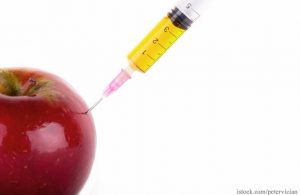The USDA decided to approve a genetically modified (GMO) apple that doesn’t brown after bruising or slicing. This apple, called the Arctic apple, was developed by Okanagan Specialty Fruits. The apple, called the “botox apple”, is produced by using a new form of genetic engineering called RNA interference or gene silencing.
 Consumer advocates and food safety groups are concerned about this apple and the new method of producing it. Andrew Kimbrell, executive director for Center for Food Safety said in a statement, “This produce is completely unnecessary and poses numerous risks to apple growers, the food industry, and consumers. For USDA to turn a blind eye to these risks for such an inessential technological ‘advance’ is foolish and potentially costly.”
Consumer advocates and food safety groups are concerned about this apple and the new method of producing it. Andrew Kimbrell, executive director for Center for Food Safety said in a statement, “This produce is completely unnecessary and poses numerous risks to apple growers, the food industry, and consumers. For USDA to turn a blind eye to these risks for such an inessential technological ‘advance’ is foolish and potentially costly.”
These apple trees could easily contaminate nearly organic or conventional apple orchards. The apples could be used to make fruit slices, juice, baby foods, and apple sauce that do not have to be labeled. Consumers would never know they are buying a genetically engineered product. In addition, scientists do not know whether gene silencing will affect the rest of the gene family in the tree.
Unfortunately, pre-sliced apples are a frequently recalled product. Browning is a signal that apples are no longer fresh. Hiding this signal could fool people into thinking they are eating a safe and fresh apple, since most bacterial contamination does not change the texture, appearance, aroma, or taste of the product.
The genes that produce polyphenol oxidase enzymes are being silenced. They increase resistance against pests and stress in the trees. The Arctic apple trees may be more vulnerable to disease and require more pesticides than conventionally grown apples. This has already happened with other plant crops that are modified to be resistant to pesticides. Pesticide use on GE cultivars in the U.S. has increased from 1.5 million pounds in 1999 to roughly 90 million pounds in 2011.
And those pesticides are finding their way into our food. Foods contaminated with glyphosate, the active ingredient in Roundup, are becoming very common. Extreme levels of Roundup have been found in genetically engineered soy and some scientists are concerned about the effects on human health.




